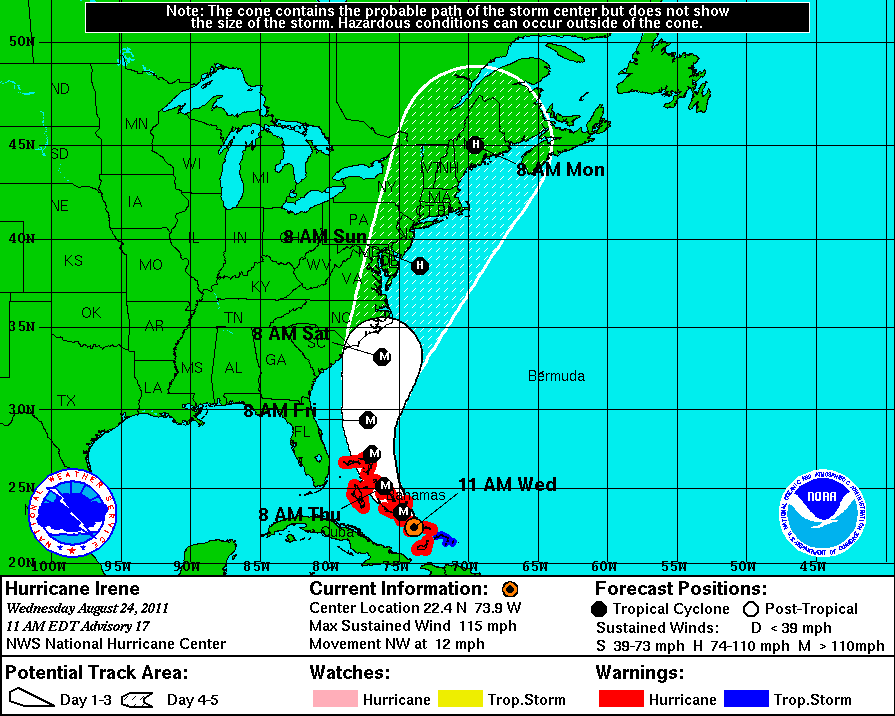As we transition from summer into fall, it’s always important to be prepared for hurricane season, but with threats of Hurricane Irene, a category 3 storm with 115 mph winds, heading for the East Coast, it’s especially crucial to understand what to do in the event that a hurricane strikes your area. Although it isn’t certain that Hurricane Irene will make a direct hit at coastal locations from North Carolina to New England, a strong impact including torrential downpours, flooding, and damaging winds, is quite probable. The following hurricane preparedness tips will help your family take the appropriate precautions to remain safe in the event that Hurricane Irene affects your area.
Before the Storm
- Understand the difference between a hurricane watch and a hurricane warning. While a hurricane watch signifies that a hurricane may strike within the next 24 to 36 hours, a hurricane warning means that a hurricane will likely hit your area within 24 hours.
- Plan an evacuation route with your family.
- Board up all your windows and close storm shutters.
- Stock up on non-perishable goods and water.
- Ensure that you have an ample amount of batteries and flashlights, as well as a functioning portable radio.
- Secure all outdoor objects, like patio furniture, or move them inside.
- Ensure that your car has a full tank of gas incase you must leave immediately.
During the Hurricane
- If at home, remain indoors and away from all glass objects. Listen to the radio for important storm information and instructions, and do not go outside, even if the storm appears to have calmed. The “eye” of the storm can pass quickly, and you do not want to be caught outside when strong winds return.
- If you must evacuate, leave immediately and be sure to inform a relative or friend of your whereabouts.
After the Hurricane Hits
- Stay tuned to the television or radio, and if you evacuated, wait until authorities confirm that it’s safe to return home.
- Avoid downed power lines.
- Use caution when checking for gas leaks or electrical system damage, and make temporary repairs as necessary.

In addition to taking these safety precautions, it’s also important that you have proper insurance in place to cover any damages resulting from Hurricane Irene. Although a standard homeowners insurance policy covers damage caused by a windstorm, you may consider purchasing flood insurance, coverage that is generally not included. Even if Hurricane Irene passes through your area quietly, the National Oceanic and Atmospheric Administration (NOAA) has estimated that there is a 65% chance of having an above normal 2011 Atlantic hurricane season. NOAA has also predicted that there will be:
12 – 18 Named Storms (sustained winds greater than 38 mph)
6 – 10 Hurricanes (sustained winds 74 mph & greater)
3 – 6 Major Hurricanes (sustained winds 111 mph & greater)
Considering these predictions, it’s more important than ever to be prepared for the possibility of a hurricane. Reviewing hurricane preparedness tips and talking to your insurance agent will help ensure that your family, home, and assets remain safe in the event of a hurricane.
For more information and updates on Hurricane Irene as it moves toward the East Coast, use the NOAA’s Hurricane Irene Tracking website. To learn more about hurricane preparedness and insurance coverage, contact the Eaton & Berube office nearest to you. For additional tips on preparing for the storm, please review the Hurricane Safety Checklist provided by Red Cross below:
 Hurricane Irene Safety Checklist
Hurricane Irene Safety Checklist
To request a free insurance quote, please fill out and submit our Online Insurance Quote Request Form.
Photo courtesy of NOAA.gov
